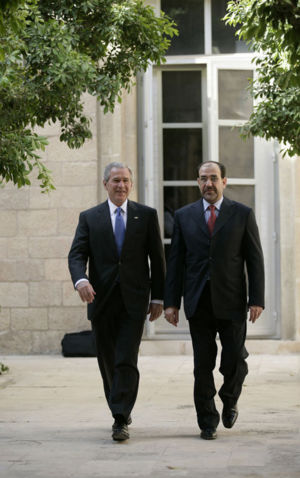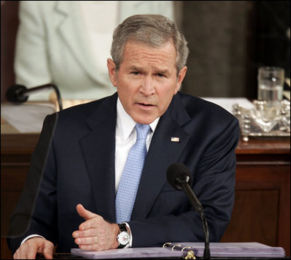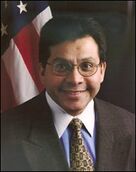George W. Bush: Difference between revisions
imported>Richard Jensen (drop minor drug issues -- not a major issue) |
imported>Yi Zhe Wu (→Social policy: italicize case name, like WP, revert if CZ doesn't do that...) |
||
| Line 24: | Line 24: | ||
==Social policy== | ==Social policy== | ||
During his presidency, Bush leaned conservative in terms of social policy. He opposed [[same-sex marriage]] and supported a constitutional amendment to federally ban it, but the amendment eventually failed. He favored and signed the [[Partial-birth Abortion Ban Act]] which prohibits a specific form of late-term [[abortion]]. The Act was passed by large majorities in Congress and was upheld in the Supreme Court in the case [[Gonzales v. Carhart]]. | During his presidency, Bush leaned conservative in terms of social policy. He opposed [[same-sex marriage]] and supported a constitutional amendment to federally ban it, but the amendment eventually failed. He favored and signed the [[Partial-birth Abortion Ban Act]] which prohibits a specific form of late-term [[abortion]]. The Act was passed by large majorities in Congress and was upheld in the Supreme Court in the case ''[[Gonzales v. Carhart]]''. | ||
==Bibliography== | ==Bibliography== | ||
Revision as of 14:24, 30 June 2007
George W. Bush first assumed office as the 43rd president of the United States in January of 2001 and is set to complete his second term in January of 2009.
He was elected as a Republican over Democrat Al Gore in a controversial election in 2000. In that election, although he lost the overall national popular vote, he won the Electoral College election, due to a roughly 500-vote difference in Florida, which moved that state's electors into the Bush column. His victory in Florida was corroborated by the 5-4 Supreme Court decision Bush v. Gore which ended Gore's efforts to recount the vote again. Bush was re-elected over Senator John Kerry in 2004 by a three million vote margin. Prior to his presidency he was governor of Texas (1994-2001), and served as an aide to his father, President George H.W. Bush.
Important markers during his administration included the September 11th terrorist attack, the invasions of Afghanistan and Iraq, the expansion of NATO to the Russian border, the midterm election gains of 2002, the midterm loss of Congress in the 2006 elections, improved relations with India, the passage of the PATRIOT Act, the No Child Left Behind education act, repeated large-scale tax cuts, the economic recovery, the boom (and later correction) in real estate, the debate on illegal immigration, the handling of the 2005 Hurricane Katrina disaster, the U.S. Attorneys dismissal controversy, and the appointments of conservatives to the Supreme Court and Federal Reserve chairmanship. Intense controversy in 2007 focused on the war in Iraq, with the Democrats uniting in opposition. Bush will be ineligible for the presidential election in 2008 due to a two-term limit in the United States Constitution.
September 11th and the War on Terror
On September 11, 2001, a team of 19 hijackers launched suicide attacks that destroyed the World Trade Center in New York and damaged the Pentagon, causing 3000 deaths in the worst terrorist attack in American history. The Islamic fundamentalist Osama Bin Laden would later claim responsibility for the attacks, which Bush would declare marked the beginning of a U.S.-led "war on terror" to combat terrorism. He ordered the invasion of Afghanistan to overthrow the Taliban government, which had given asylum to Bin Laden. However, Bin Laden himself was never found. The ramifications of the September 11th also included the invasion of Iraq, overthrowing the dictatorial regime of Saddam Hussein, along with the country's subsequent slide into civil conflict, and the passage of the PATRIOT Act, to facilitate the detection of terrorist activities.
War in Iraq

The war in Iraq was the defining event of Bush's second term; as the war became increasingly unpopular his own ratings fell, and his influence weakened. Bush had three goals, overthrowing the cruel and dangerous regime of Saddam Hussein, establishing a model democracy in Iraq, and leaving after stability was assured. There was no question about Saddam's horrors, but his dangers to the U.S. appeared exaggerated when no weapons of mass destruction were discovered. The Iraqis did create a democracy, but stability was growing less because of a violent insurgency as Sunnis fought Shiites. Over 2000 American soldiers were killed by ambush by mid 2007. By late 2006 the Democrats had united on demanding a fixed timetable for withdrawal. That helped the Democrats gain control of the House and Senate in 2006, but the party was unable to use its majorities to force a timetable in 2007.
Courts and Justice
Bush nudged the U.S. Supreme Court to the right with his successful nominationsof John Roberts as Chief Justice and Samuel Alito as Associate Justice of the Supreme Court in 2005. Liberal opponents denounced the these nominees as too conservative, but both were speedily confirmed. His nomination of three judges to the federal circuit courts, Janice Rogers Brown, William Pryor, and Priscilla Owen were threatened with filibuster from Senatorial Democrats, but a bipartisan coalition (calling itself the "Gang of 14") reached a bipartisan compromise and these judges were likewise confirmed. A scandal hit the Justice Department in 2007 as Republicans demanded, but did not get, the resignation of Attorney General Alberto Gonzalez, for using partisan criteria to remove nine Republican district attorneys.[1] Fierce debates, some reaching the Supreme Court, raged over the proper legal status of prisoners from the Mideast conflict held in CIA prisons and the psison the U.S. operated at Guantanamo (in Cuba).
Social policy
During his presidency, Bush leaned conservative in terms of social policy. He opposed same-sex marriage and supported a constitutional amendment to federally ban it, but the amendment eventually failed. He favored and signed the Partial-birth Abortion Ban Act which prohibits a specific form of late-term abortion. The Act was passed by large majorities in Congress and was upheld in the Supreme Court in the case Gonzales v. Carhart.
Bibliography
- Academic
- Berggren, D. Jason, and Nicol C. Rae. "Jimmy Carter and George W. Bush: Faith, Foreign Policy, and an Evangelical Presidential Style." Presidential Studies Quarterly. 36#4 2006. pp 606+. online edition
- Campbell, Colin, and Bert A. Rockman, eds. The George W. Bush Presidency: Appraisals and Prospects. Congressional Quarterly Press, 2004.
- Anthony Corrado, E. J. Dionne Jr., Kathleen A. Frankovic. The Election of 2000: Reports and Interpretations (2001) online edition
- Edwards III, George C. and Philip John Davies, eds. New Challenges for the American Presidency New York: Pearson Longman, 2004. 245 pp. articles from Presidential Studies Quarterly
- Greenstein, Fred I. ed. The George W. Bush Presidency: An Early Assessment Johns Hopkins University Press, 2003
- Greenstein, Fred I. “The Contemporary Presidency: The Changing Leadership of George W. Bush A Pre- and Post-9/11 Comparison” in Presidential Studies Quarterly v 32#2 2002 pp 387+. online edition
- Gregg II, Gary L. and Mark J. Rozell, eds. Considering the Bush Presidency Oxford University Press, 2004. 210 pp. British perspectives
- Hendrickson, Ryan C., and Kristina Spohr Readman, "From the Baltic to the Black Sea: Bush's NATO Enlargement." White House Studies. (2004) 4#3 pp: 319+. online edition
- Hilliard, Bryan, Tom Lansford, and Robert P Watson, eds. George W. Bush: Evaluating the President at Midterm SUNY Press 2004
- Jacobson, Gary C. “The Bush Presidency and the American Electorate” Presidential Studies Quarterly v 33 #4 2003 pp 701+. [www.questia.com/PM.qst?a=o&d=5002052614 online edition]
- Moens, Alexander The Foreign Policy of George W. Bush: Values, Strategy, and Loyalty. Ashgate, 2004. 227 pp.
- Sabato, Larry J. ed. The Sixth Year Itch: The Rise and Fall of the George W. Bush Presidency (2007), experts on the 2006 elections in major states
- Pro-Bush
- Barnes, Fred. Rebel-in-Chief: How George W. Bush Is Redefining the Conservative Movement and Transforming America (2006)
- Robert Draper. Inside the Bush White House: The Presidency of George W. Bush (2007), authorized biography* Karen Hughes. George W. Bush: Portrait of a Leader, (2005)
- Bob Woodward. Plan of Attack (2003) on Iraq war
- Anti-Bush
- Bruce Bartlett, Impostor: How George W. Bush Bankrupted America and Betrayed the Reagan Legacy (2006), conservative attack by former aide
- James Moore and Wayne Slater. Bush's Brain: How Karl Rove Made George W. Bush Presidential. 2003. online edition
- Ron Suskind. The Price of Loyalty: George W. Bush, the White House, and the Education of Paul O’Neill (2004), complaints of ex Treasury Secretary
- James Moore and Wayne Slater. Bush's Brain: How Karl Rove Made George W. Bush Presidential, (Wiley, 2003) online edition
- Primary sources
- George W. Bush. George W. Bush on God and Country: The President Speaks Out About Faith, Principle, and Patriotism (2004)
- ↑ Seven senior Justice department officials did resign.

